Pуководящие указания
В этом разделе вы можете найти все руководящие принципы для законотворческой деятельности, подготовленные БДИПЧ в целях помощи государствам-участникам при разработке правового режима, который соответствовал бы обязательствам ОБСЕ и иным международным стандартам. Руководящие принципы предоставляют примеры хорошей практики в соответствующей области. Некоторые из них подготовлены в сотрудничестве с Европейской комиссией за демократию через право Совета Европы (Венецианской комиссией).
Guidelines for Review of Legislation pertaining to Religion or Belief (2004) (English)
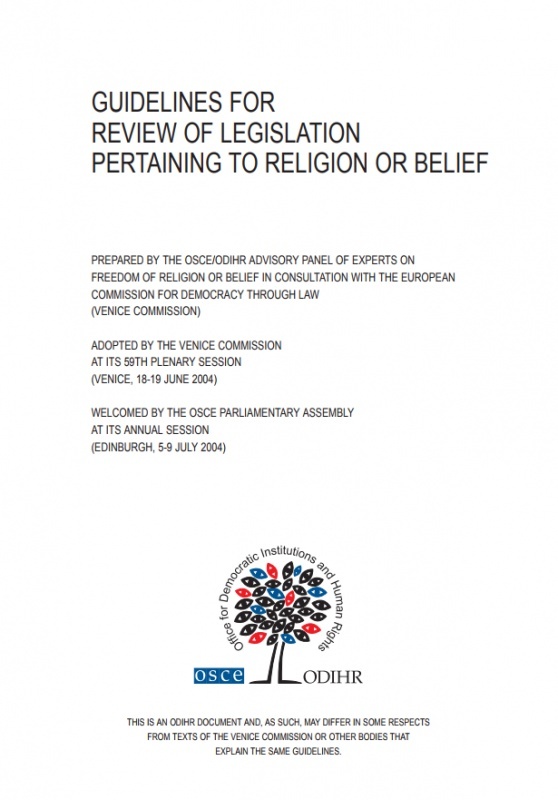
These Guidelines for Review of Legislation Pertaining to Religion or Belief were prepared by the members of the Advisory Panel of Experts on Freedom of Religion and Belief (Panel) of the Office for Democratic Institutions and Human Rights (ODIHR) of the Organization for Security and Co-operation in Europe (OSCE) in consultation with the European Commission for Democracy through Law (the Venice Commission) of the Council of Europe.
Files:
PDF 259.15 КБ

Guidelines for Reviewing a Legal Framework for Elections (2013) (English)
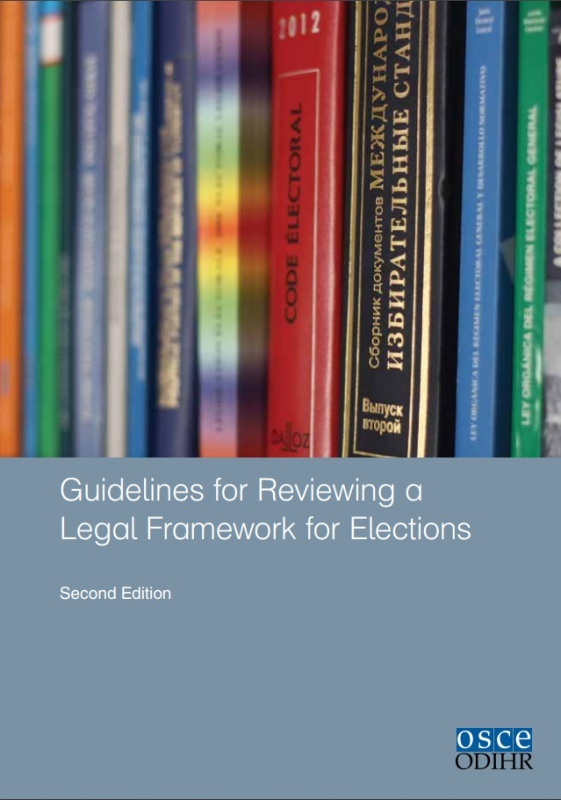
These guidelines detail the components of a legal framework governing elections and the relevant standards for democratic elections. They are intended to contribute to uniformity, reliability, consistency and accuracy in the review and preparation of electoral legislation. Therefore these guidelines can provide guidance to both reviewers of electoral legislation and to national authorities when they draft or amend election-related documents.
Files:
PDF 259.15 КБ

Guidelines on Democratic Lawmaking for Better Laws (2024) (English)
The quality of laws is a direct consequence of the manner in which they are developed and discussed. Lawmaking procedures and practices should follow democratic principles, adhere to the rule of law and comply with international human rights obligations and standards. At the same time, they should be evidence-based, open and transparent, participatory and inclusive, and subject to effective oversight.
The Guidelines aim to provide an overview of the guiding principles of democratic lawmaking followed by concrete and practical recommendations on how these guiding principles can be adhered to at each stage of the legislative cycle to achieve good-quality laws, based on the rule of law and human rights. These principles and standards underly the process of preparing, discussing, adopting, implementing and evaluating laws; at the same time, the Guidelines seek to showcase how to make such processes effective.
Files:
PDF 3.31 МБ
Guidelines on Freedom of Association (2014) (English)
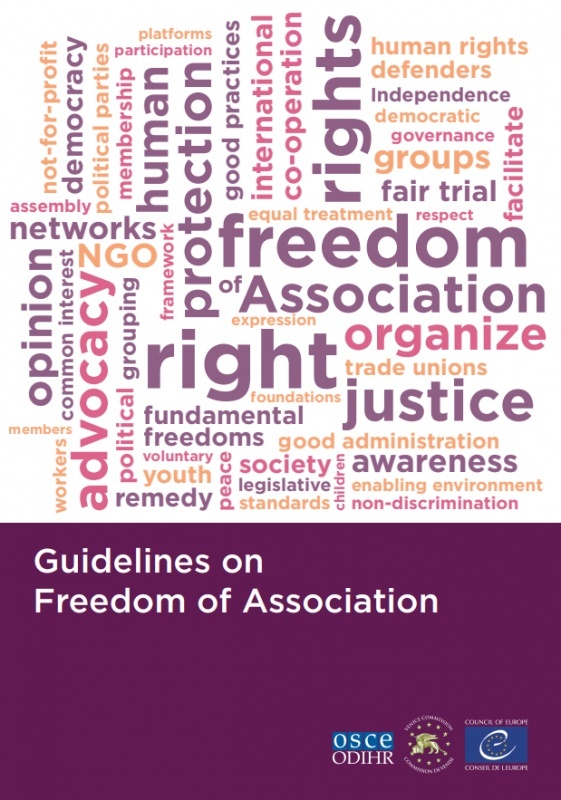
The joint OSCE/ODIHR and Venice Commission Guidelines on Freedom of Association aim to offer advice and expertise on how to legislate on freedom of association-related matters, in a manner that is compliant with international human rights standards and OSCE commitments. They also reflect evolving good state practices, and are intended to enhance awareness of the above right in general. They will offer a practical toolkit to legislators tasked with drafting laws which regulate or affect associations, but also to associations, members of associations and human rights defenders, to support advocacy in this field of human rights law.
Files:
PDF 1.64 МБ

Guidelines on Freedom of Peaceful Assembly (1st edition, 2007) (English)
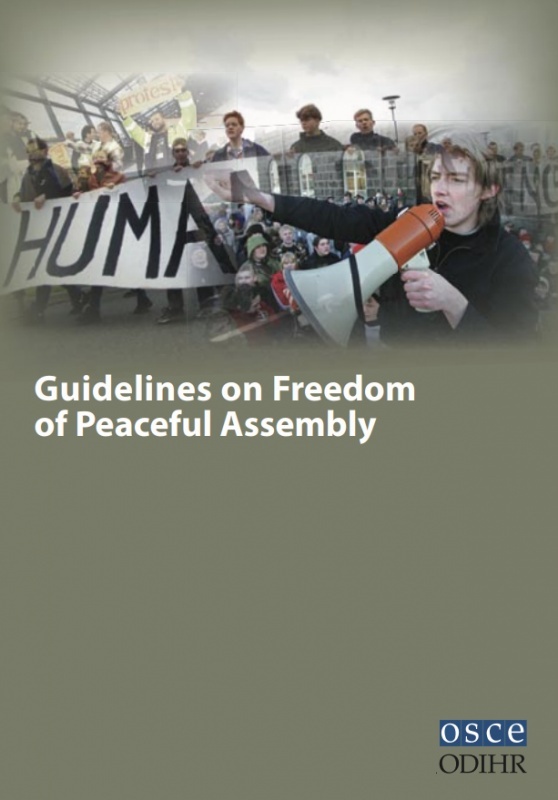
These Guidelines on Freedom of Peaceful Assembly together with the Interpretative Notes were prepared by the Panel of Experts on Freedom of Assembly of the Office for Democratic Institutions and Human Rights (ODIHR) of the Organization for Security and Co-operation in Europe (OSCE) in consultation with the European Commission for Democracy though Law (the Venice Commission) of the Council of Europe.
The Document takes into account comments received from members of the Venice Commission who were consulted on an initial draft of these Guidelines.
Files:
PDF 741.96 КБ

Guidelines on Freedom of Peaceful Assembly (2nd edition, 2010) (English)
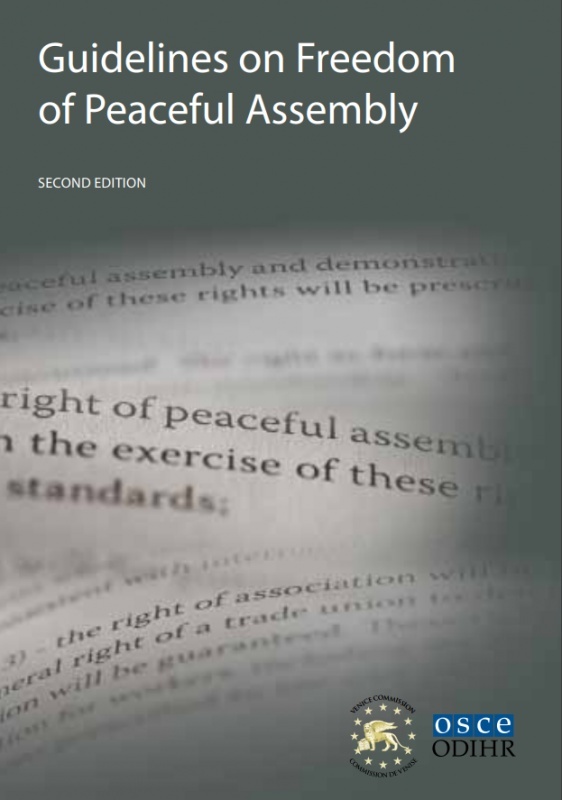
The Guidelines offer a practical toolkit for legislators and practitioners responsible for implementing laws by drawing on good-practice examples from national legislations in European and OSCE participating States and the case-law of the European Court of Human Rights to illustrate the various legislative options used to regulate issues pertaining to the freedom of assembly.
Files:
PDF 2.04 МБ

Guidelines on Political Party Regulation (1st edition, 2010) (English)
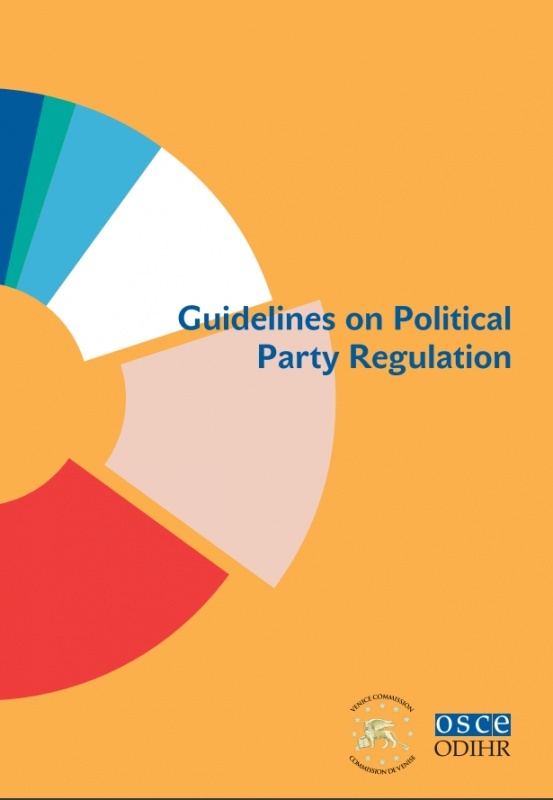
These Guidelines on Political Party Regulation have been created as a tool to assist OSCE participating States and Council of Europe Member States in formulating legal frameworks that comply with OSCE commitments and other international standards in facilitating the proper establishment, development and functioning of political parties.
Files:
PDF 2.53 МБ

Guidelines on Political Party Regulation (2nd edition, 2020) (English)
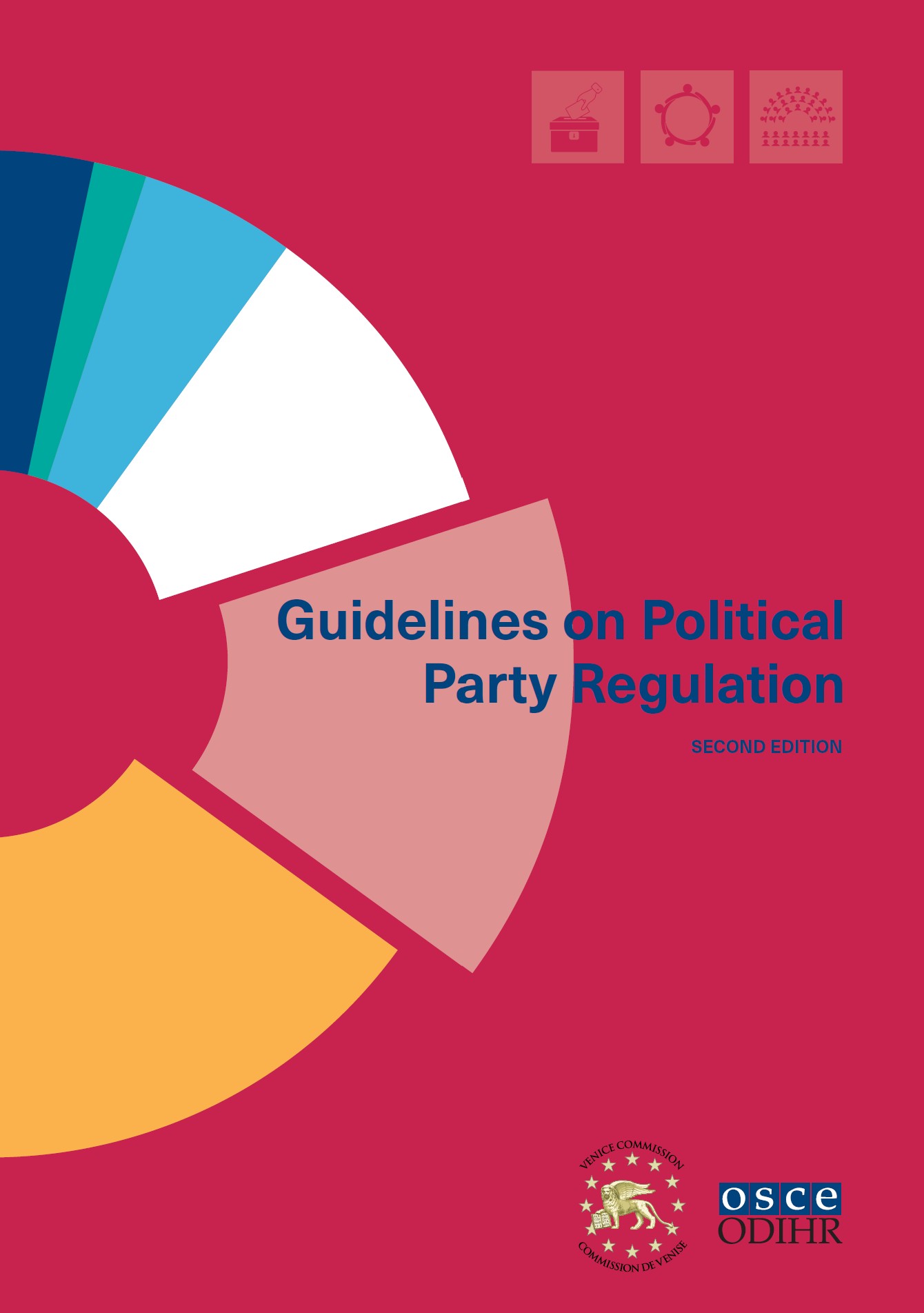
The Guidelines offer advice and expertise to legislators tasked with drafting laws on political parties, with a view to facilitating their establishment, development and functioning in compliance with international human rights standards and OSCE human dimension commitments.
They may also serve other public authorities, the judiciary, legal practitioners, human rights defenders, etc., concerned with political party regulation, including political parties themselves, their leadership and members.
The Guidelines are intended not only to articulate a minimum baseline in relation to international standards, by marking a threshold that must be met by states in their regulation of political parties but also as a reflection of legal developments at the international and domestic levels and of good practices.
Files:
PDF 2.69 МБ

Guidelines on the Implementation of the Law on Freedom of Assembly of the Republic of Azerbaijan (2008) (English)
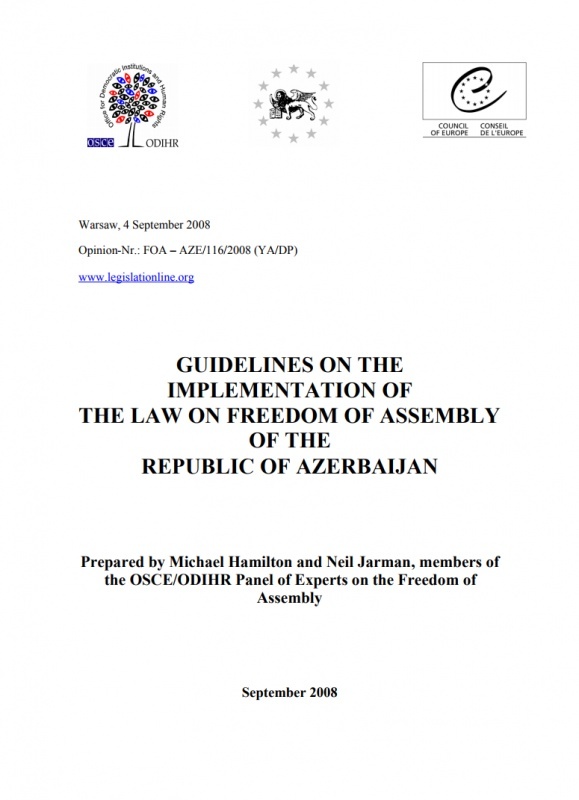
These Guidelines are primarily based on the OSCE/ODIHR Guidelines on Freedom of Peaceful Assembly (March 2007). However, they also draw upon recent case law of the European Court of Human Rights in relation to cases under both Article 11 and Article 10 of the European Convention on Human Rights; on examples of good practice in relation to the regulation and policing of assemblies in a variety of countries; and on a number of reports that have been published in response to outbreaks of violence in relation to public assemblies.
Files:
PDF 555.4 КБ

Guidelines on the Legal Personality of Religious or Belief Communities (2014) (English)
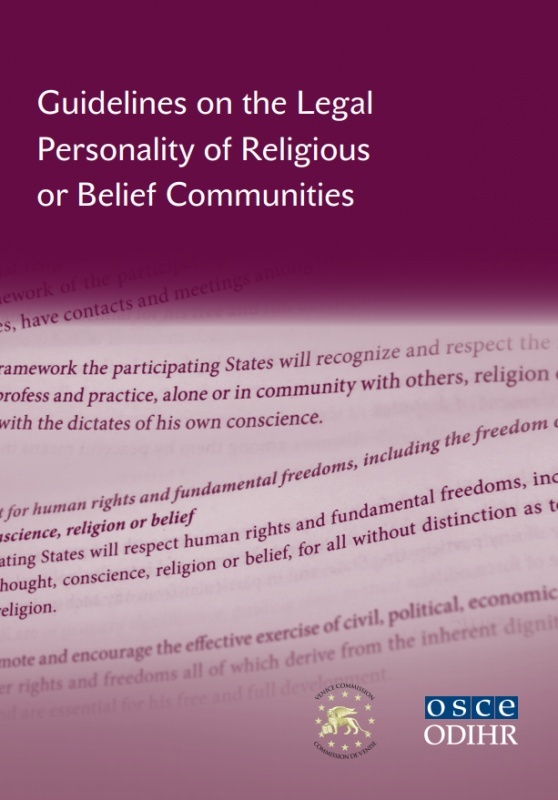
The purpose of these Guidelines is to ensure that those involved in drafting and applying legislation in the area of the freedom of religion or belief, including civil society representatives, have at their disposal a benchmark document containing minimum international standards in the area of recognition of religious or belief communities. The document does not seek to challenge established agreements between states and religious or belief communities but, rather, to delineate the legal framework that would ensure that communities wishing to do so have a fair opportunity to be granted legal personality, and that the criteria established are applied in a non-discriminatory manner.
Files:
PDF 2.04 МБ

Joint Guidelines for Preventing and Responding to the Misuse of Administrative Resources During Electoral Processes (2016) (English)
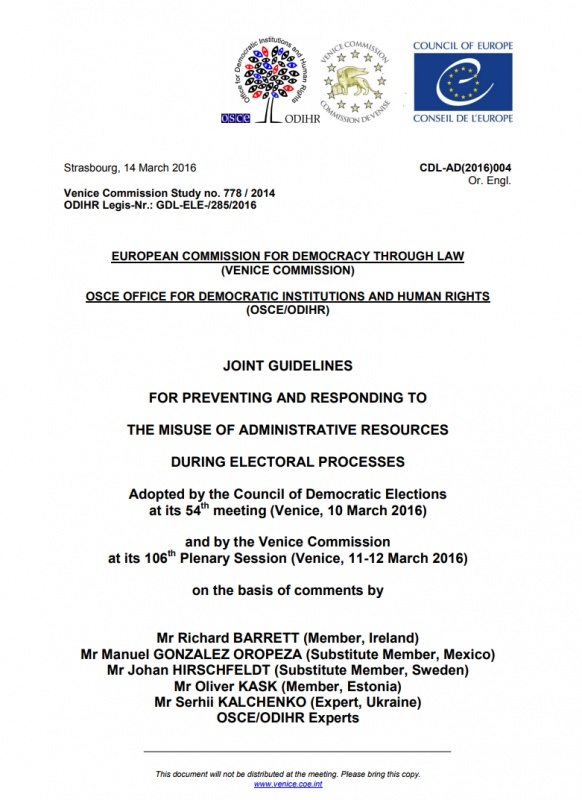
The Guidelines are aimed at assisting national lawmakers and other authorities in adopting laws and initiating concrete measures to prevent and act against the misuse of administrative resources during electoral processes. Therefore, they are not intended as a set of hard rules. The guidelines among others build upon the OSCE/ODIHR’s election observation findings and recommendations in respect of the misuse of administrative resources.
Files:
PDF 260.63 КБ

Making Laws Work for Women and Men: A Practical Guide to Gender-Sensitive Legislation (2017) (English)
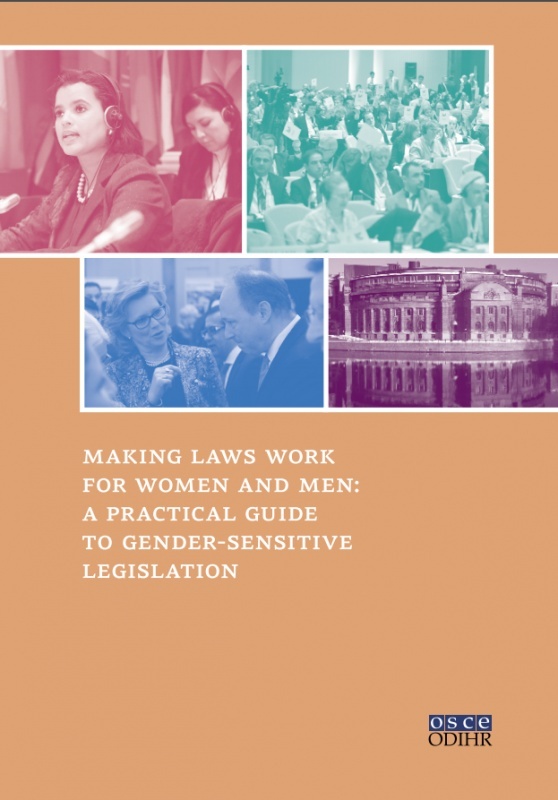
ODIHR’s Making Laws Work for Women and Men: A Practical Guide to Gender-Sensitive Legislation looks at the legislative process as a vital entry point for gender mainstreaming, while taking into account the direct and tangible impact of legislation on people’s lives. The Guide is primarily intended for members of parliament and parliamentary staff, and aims to offer practical guidance on what gender-sensitive legislation is, why it is important, what it consists of and how it can be integrated it into routine parliamentary work.
Files:
PDF 1.45 МБ

ODIHR Brief Guiding Principles of Democratic Lawmaking and Better Laws (2024) (Russian)

Учитывая продолжающуюся эрозию демократических и конституционных стандартов и верховенства права во всем мире, а также снижение общественного доверия к демократическим институтам, крайне важно укреплять демократические институты и процессы, поощряя открытость, прозрачность, инклюзивность и подотчетность в законотворчестве. Современное законотворчество демонстрирует ряд недостатков, включая отсутствие надлежащих политических обсуждений, оценок воздействия или общественных консультаций перед разработкой закона и практику оттеснения демократических институтов на второй план в ходе законодательного процесса. В принципе, процедуры и практика законотворчества должны следовать демократическим принципам, придерживаться верховенства права и соответствовать международным обязательствам и стандартам в области прав человека. Демократический законотворческий процесс не только приводит к лучшим законам, но и обычно улучшает реализацию принятых законов, в конечном итоге повышая общественное доверие к демократическим институтам и процессам.
Для устранения этих недостатков БДИПЧ разрабатывает Руководство по демократическому законотворчеству для улучшения законов, которое состоит из обзора Руководящих принципов демократического законотворчества, за которым следуют конкретные и практические рекомендации о том, как эти руководящие принципы могут соблюдаться на каждом этапе законодательного цикла для достижения качественных законов, основанных на ключевых стандартах верховенства права и прав человека. В этом кратком изложении освещаются некоторые ключевые концепции, содержащиеся в предстоящих Руководящих принципах, и дается обзор Руководящих принципов демократического законотворчества и улучшения законов.
Files:
PDF 3.31 МБ

ODIHR Brief Guiding Principles of Democratic Lawmaking and Better Laws (2024) (Ukranian)
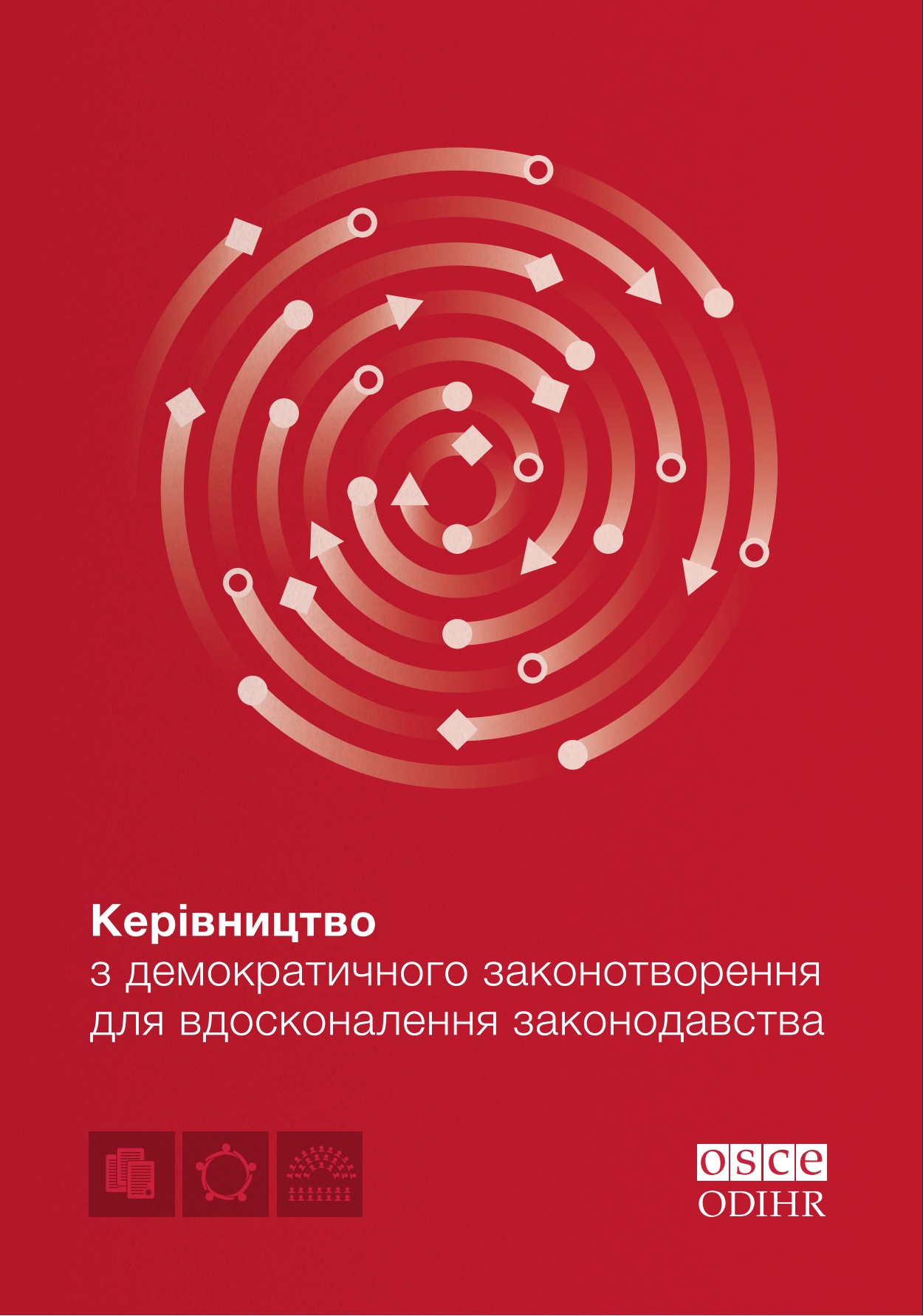
Враховуючи триваючу ерозію демократичних і конституційних стандартів і верховенства права в усьому світі, а також зниження довіри суспільства до демократичних інституцій, дуже важливо зміцнювати демократичні інституції та процеси шляхом сприяння відкритості, прозорості, інклюзивності та підзвітності у законотворчій діяльності. Сучасна законотворча діяльність демонструє низку недоліків, включаючи відсутність належних обговорень політики, оцінки впливу чи публічних консультацій перед розробкою закону, а також практику відсторонення від демократичних інститутів протягом законодавчого процесу. В принципі, законотворчі процедури та практика мають відповідати демократичним принципам, дотримуватися верховенства права та відповідати міжнародним зобов’язанням і стандартам у сфері прав людини. Демократичний законотворчий процес не тільки призводить до кращих законів, але зазвичай покращує імплементацію прийнятих законів, зрештою зміцнюючи суспільну довіру до демократичних інститутів і процесів.
Щоб усунути ці недоліки, БДІПЛ розробляє Керівні принципи демократичної законотворчості для кращих законів, які складаються з огляду Керівних принципів демократичного законотворчого процесу та конкретних практичних рекомендацій щодо того, як цих керівних принципів можна дотримуватися на кожному етапі законодавчої діяльності. цикл для досягнення якісних законів, заснованих на ключових стандартах верховенства права та прав людини.У цьому Короткому матеріалі висвітлюються деякі з ключових концепцій, що містяться в майбутніх Керівних принципах, і надається огляд Керівних принципів демократичного законотворення та кращих законів.
Files:
PDF 3.23 МБ

ODIHR Brief: Guiding Principles of Democratic Lawmaking and Better Laws (2023) (English)
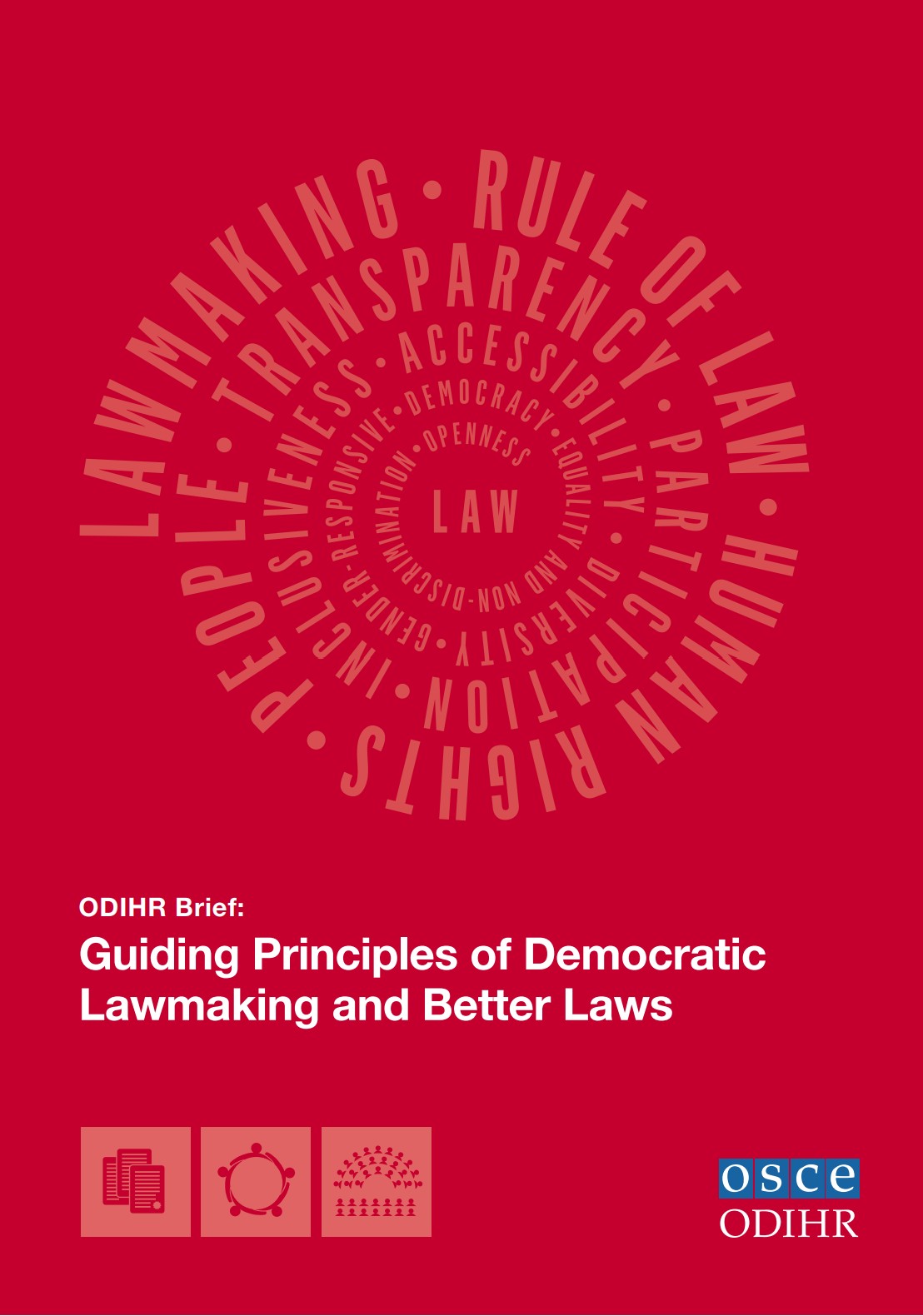
Given the ongoing erosion of democratic and constitutional standards and the rule of law across the world, and declining public trust in democratic institutions, it is essential to strengthen democratic institutions and processes by promoting openness, transparency, inclusiveness and accountability in lawmaking. Contemporary lawmaking displays a number of weaknesses, including a lack of proper policy discussions, impact assessments or public consultations before drafting a law and the practice of sidelining democratic institutions throughout the legislative process. In principle, lawmaking procedures and practices should follow democratic principles, adhere to the rule of law and comply with international human rights obligations and standards. A democratic lawmaking process not only leads to better laws but usually improves the implementation of the adopted laws, ultimately enhancing public trust in democratic institutions and processes.
To address these weaknesses, ODIHR is developing the Guidelines on Democratic Lawmaking for Better Laws, which consists of an overview of the Guiding Principles of democratic lawmaking followed by concrete and practical recommendations on how these guiding principles can be adhered to at each stage of the legislative cycle to achieve good quality laws, based on key rule of law and human rights standards. This Brief highlights some of the key concepts contained in the forthcoming Guidelines and provides an overview of the Guiding Principles of Democratic Lawmaking and Better Laws.
Files:
PDF 2.87 МБ




